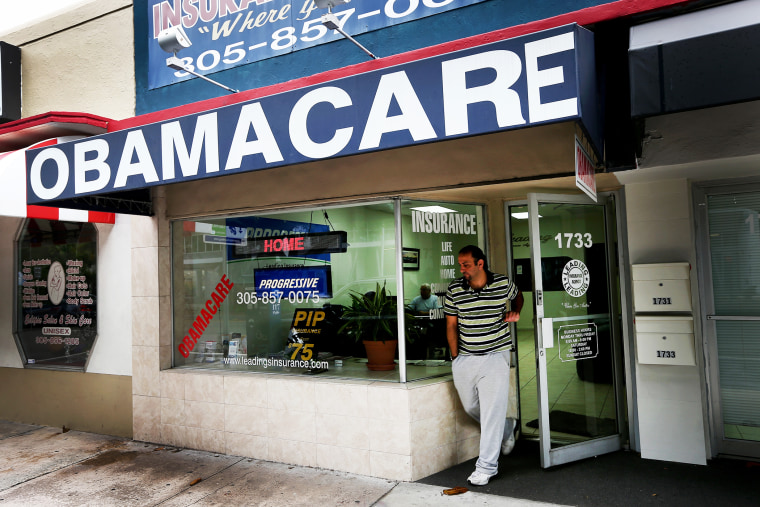At a Monday press conference, President Obama was asked about the pending ruling in the King v. Burwell case, and he expressed optimism that the Supreme Court would be responsible. But if it's not, the president added, "Congress could fix this whole thing with a one-sentence provision."
It took about five minutes for Republicans to reject this resolution. Politico reported this week:
Senate Republicans quickly shot down that possibility. "Let's be clear: if the Supreme Court rules against the administration, Congress will not pass a so-called 'one-sentence' fake fix," said Sen. John Barrasso (Wyo.), the Senate's No. 3 Republican.
Remember when Supreme Court Justice Antonin Scalia said, during King oral arguments, that lawmakers would approve a simple legislative fix? Scalia, responding to Solicitor General Don Verrilli, specifically said, "If the consequences are as disastrous as you say, so many million people without insurance and whatnot, yes, I think this Congress would act."
Just two days ago, Senate Republican Policy Chairman John Barrasso made clear that Scalia is mistaken.
In theory, I suspect much of the American mainstream might find this bizarre, if not hard to believe. If a court ruling would cause systemic chaos and strip millions of families of their health care benefits, but there's a simple, one-sentence fix that would prevent anyone from suffering at all, most Americans probably assume that Congress would just take a few minutes, approve the sentence, and prevent imposing deliberate hardship on the country.
Indeed, it probably seems like common sense -- the bare minimum of public service should lead elected officials to at least try to shield the public from pointless, unnecessary, and easily avoided harm.
But in a political environment in which there's a radicalized political party, and that party controls the entirety of the legislative branch, those assumptions need to be recalibrated.
Congressional Republicans, despite literally years of unmet promises, have no alternative to the Affordable Care Act, and have not yet said what they'll do, exactly, if their allied Republican justices rule their way in this case. That said, Vox's Sarah Kliff explained this week that GOP lawmakers have shared some potential plans on how they might try to proceed.
Republicans lawmakers have also come up with five alternatives plans to keep the dollars flowing [if they prevail in King v. Burwell]. The question is whether they'll do much good. Most of the plans would extend the availability of subsidies, while dismantling other parts of Obamacare. The result would likely be a world that looks much more like America before Obamacare -- where fewer people are enrolled in coverage and are paying higher premiums.
You're welcome to review each of the five proposals here, but they're all (a) awful; (b) far more complicated and dangerous than the obvious, simple, one-sentence remedy; and (c) predicated on the assumption that Republicans will prevent some Americans from suffering in the short term, but only if Republicans can cause more Americans to suffer soon after.
Or put another way, the GOP's policy vision isn't to shield victims of a potentially ridiculous Supreme Court case; their vision to create victims of a potentially ridiculous Supreme Court case.
Kliff added yesterday, "The problem is that all five Republican plans try to fix Obamacare and repeal Obamacare at the same time. The result is that all five plans try to fix a political problem for Republicans -- the Supreme Court, at the behest of the Republican Party, has just ripped insurance from millions of Americans -- by creating a new political problem for Republicans."
Some caveats are probably in order. For example, all of this is speculative based on the possibility of Supreme Court justices acting in an indefensible way. They may very well adjudicate responsibility, making the entire debate a moot point. We may soon learn that Republicans have lost, consumers have won, and it's time to start arguing about something else entirely.
We also don't know which, if any, GOP remedy will become the consensus Republican approach to a potential court win. There are five proposals bouncing around, all of which are absurd, but none of which have been embraced as official GOP policy.
Finally, because we don't yet know what the high court will do, we can't say with confidence how the players will react when faced with a genuine crisis. Today, it's an academic debate. Next week, perhaps, it may be very real.
At this point, all we can say is that millions of Americans are facing a serious threat; Republicans have no policy solution of their own; and GOP officials don't appear to have any plan on what to do if they successfully take a sledgehammer to the U.S. health care system for no particular reason.
